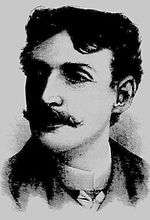Monroe Rosenfeld
Monroe H. "Rosey" Rosenfeld (c.1861 – December 13, 1918) was an American songwriter and journalist. He is credited with coining the term "Tin Pan Alley", around 1903.
Monroe H. Rosenfeld | |
|---|---|
 | |
| Background information | |
| Born | c.1861 Richmond, Virginia, United States |
| Died | December 13, 1918 (aged c.57) New York City, U.S. |
| Genres | Traditional pop music, vaudeville |
| Occupation(s) | Songwriter, journalist, music publisher |
| Years active | c.1880–1918 |
Biography
Rosenfeld was born in Richmond, Virginia, the son of German immigrants. By the early 1880s, he was working in New York City as a songwriter, often using pseudonyms such as E. Heiser and F. Belasco. He started having success around 1884 with such songs as "Climbing Up the Golden Stairs", and "Her Golden Hair Was Hanging Down Her Back", written with Scottish-born composer Felix McGlennon and recorded by Dan Quinn.[1] His other successes as a songwriter included "Johnny Get Your Gun" (1886, credited as F. Belasco), and "With All Her Faults I Love Her Still" (1888). The latter song was based on an earlier tune by Theodore Metz, but Rosenfeld was notorious for making use of lax copyright laws to claim publishing rights in his own name, and sometimes bragged that he stole some of his best tunes. Rosenfeld was regarded as "a master of the tragic boy-girl tale set to music", and became a well-known local character, noted for his loves of poker, women and gambling.[2][3]
Described as "restless and volatile", Rosenfeld also worked as a press agent and journalist. In 1899, he started writing a series of articles on popular music in the New York Herald. Reputedly, he visited the office of songwriter Harry Von Tilzer, who used a piano with muffled keys to reduce the likelihood of complaints from his neighbors, and commented that the sound reminded him of tin cans, to which von Tilzer replied, "Yes, I guess this is a tin pan alley." The phrase was contained in the title of one of Rosenfeld's articles and became widely used as a description of the area of songwriting offices on West 28th Street in Manhattan.[2][3]
In 1917, Rosenfeld became the editor of a music magazine, The Tuneful Yankee, and set up an office to manage music copyrights. He died in 1918, of acute indigestion.[2]
References
- Whitburn, Joel (1986). Pop Memories 1890-1954: The History of American Popular Music. Menomonee Falls, Wisconsin: Record Research, Inc. pp. 360. ISBN 0-89820-083-0.
- Dale Brumfield, "The Song Thief: How a melodic kleptomaniac from Richmond coined the phrase Tin Pan Alley", Style Weekly, February 25, 2014. Retrieved 12 April 2017
- Gammond, Peter (1991). The Oxford Companion to Popular Music. Oxford: Oxford University Press. pp. 504. ISBN 0-19-311323-6.